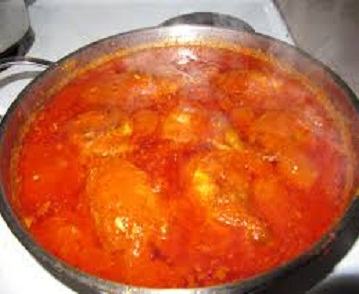How to Cook Nigerian Stew ~ Tomato Red with Ram Meat
How to Cook Nigerian Stew
Nigerian Tomato Stew (Nigerian Red Stew) with Ram Meat
Hello, friends!
It’s been a while since I’ve written, but I’m back—and I’m back with something great. This Nigerian tomato stew is a staple in our household now.

Yes, eventually, I did cave and give it to them. Today, however, I’m taking a step further by sharing it with you folks—my lovely readers.
This is not just any ordinary African tomato stew; I’m cooking it with farm-raised ram meat, providing a delightful gamey flavor that suits the dish well.
Nigerian Stew # What Makes Nigerian Tomato Stew So Special?
Tomato stew is a top menu item across West Africa, especially in Nigeria, where it is served at tables and festivities.
Similar to Ofada stew, the red stew is more prevalent since it’s simple to cook and possesses incredible depth of flavor.
Essentially, it’s a rich pepper and tomato stew built on onions, oil, and protein. The only difference is in the variety of oil, vegetables, texture, and protein.
In this recipe, I choose ram meat not just for the flavor but also due to the nostalgia factor. Ram meat was a celebratory meal when I was younger, and it was always shared by neighboring friends during Eid celebrations.
Ram is costly and usually reserved for special occasions, but its earthy flavor makes this recipe worth every single crumb even if it is not a celebration time.
Nigerian Stew Ingredients
- 2 lbs (907 g) braised ram meat chunks – Ram is stronger and coarser than lamb. Or, if it is unavailable, substitute goat meat, stew-cut lamb, beef, old hens, or even pork.
- 5 lbs (1570 g) plum tomatoes – Use Roma or any sweet, low-moisture variety. When not in season, use good-quality canned whole tomatoes.
- 2 large onions – Use one for blending, one for caramelizing.
- 2 large red bell peppers – Ideally “tatashe,” the Nigerian variety.
- 4 scotch bonnet peppers – Tailor to your heat tolerance.
- 3 cloves of garlic
- 1 thumb-sized piece of ginger
- ½ cup flavorless oil – I use grape seed oil, but canola, corn, avocado, or vegetable oil also.
- 1¾ cups lamb stock – I use the braising liquid from the ram.
- 1 tbsp curry powder
- 2 tsp dried thyme
- 1 tsp bouillon powder or cube
- Salt to taste
Nigerian Stew Directions
- Blend the Base
Blend the tomatoes, one onion, bell peppers, scotch bonnet, garlic, and ginger until smooth. Reserve
- Broil the Meat
Broil the pre-braised ram meat in the oven until browned on both sides. Reserve
- Prepare the Tomato Paste
Next, pour the tomato puree mixture into a large pot. Simmer over medium heat until it reduces to a thick paste—half the initial amount.
- Caramelize Onion
While the tomato mixture is reducing, slice the second onion. Remove the paste and set it aside when it is ready. Heat the oil on medium in the same pot and add the sliced onions. Caramelize until tender and fragrant.
- Combine with Tomato Paste
Add the intense tomato paste back to the pot with the onions that have been caramelized. Stir well and cook on low-medium heat for approximately 5 minutes.
- Add Stock and Spices
Add the lamb stock and stir in curry powder, thyme, and bouillon. Continue to simmer for a further 10 minutes, stirring from time to time.
- Add the Meat
Add the broiled ram meat slowly into the stew. Stir, cover, and cook on low for 5 minutes more. Taste and salt if needed, then simmer covered for 5 minutes more.
Time to Serve Nigerian Stew!
Your aromatic, delicious Nigerian tomato stew is now available to be served! Serve the stew with boiled yams, steamed rice, beans, fried plantains, or even with traditional fufu dishes. The depth of flavor from the ram meat truly enhances the whole dish.

Final Thoughts
If you enjoy this recipe, I’d appreciate it if you could rate it and leave a comment below.


